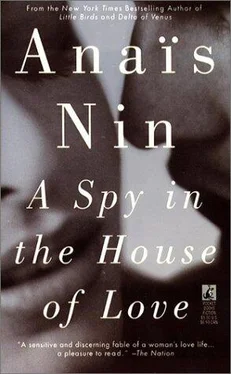“Aren’t you interested in war news, don’t you read the papers?”
“I know war, I know all about war.”
“You never seem very close to it.”
(I slept with war, all night I slept with war once. I received deep war wounds into my body, as you never did, a feat of arms for which I will never be decorated!)
In the multiple peregrinations of love, Sabina was quick to recognize the echoes of larger loves and desires. The large ones, particularly if they had not died a natural death, never died completely and left reverberations. Once interrupted, broken artificially, suffocated accidentally, they continued to exist in separate fragments and endless smaller echoes.
A vague physical resemblance, an almost similar mouth, a slightly similar voice, some particle of the character of Philip, or John, would emigrate to another, to whom she recognized immediately in a crowd, at a party, by the erotic resonance it reawakened.
The echoes struck at first through the mysterious instrumentation of the senses which retained sensations as instruments retain a sound after being touched. The body remained vulnerable to certain repetitions long after the mind believed it had made a clear, a final severance.
A similar design of a mouth was sufficient to retransmit the interrupted current of sensations, to recreate a contact by way of the past receptivity, like a channel conducting perfectly only a part of the former ecstasy through the channel of the senses arousing vibrations and sensibilities formerly awakened by a total love or total desire for the entire personality.
The senses created river beds of responses formed in part from the sediments, the waste, the overflow from the original experience. A partial resemblance could stir what remained of the imperfectly rooted-out love which had not died a natural death.
Whatever was torn out of the body, as out of the earth, cut, violently uprooted, left such deceptive, such lively roots below the surface, all ready to bloom again under an artificial association, by a grafting of sensation, given new life through this graft of memory.
Out of the loss of John, Sabina retained such musical vibration below visibility which made her insensitive to men totally different from John and prepared her for a continuation of her interrupted desire for John.
When she saw the slender body of Donald, the same small nose, the head carried on a long-stemmed neck, the echo of the old violent emotions was strong enough to appear like a new desre.
She did not observe the differences, that Donald’s skin was even more transparent, his hair silkier, that he did not spring, but glided, dragging his feet a little, that his voice was passive, indolent, slightly whining.
At first Sabina thought he was gently clowning by his parodies of women’s feathery gestures, by a smile so deliberately seductive imitating the corolla’s involutionary attractions.
She smiled indulgently when he lay down on the couch preparing such a floral arrangement of limbs, head, hands as to suggest a carnal banquet.
She laughed when he trailed his phrases like southern vines, or practiced sudden exaggerated severities as children do when they play charades of the father’s absurd arrogances, of the mother’s hot-house exudations of charm.
When Sabina crossed the street, she nourished herself upon the gallant smile of the policeman who stopped the traffic for her, she culled the desire of the man who pushed the revolving door for her, she gathered the flash of adoration from the drug clerk: “Are you an actress?” She picked the bouquet of the shoe salesman trying on her shoes: “Are you a dancer?” As she sat in the bus she received the shafts of the sun as a personal, intimate visit. She felt a humorous connivance with the truck driver who had to pull the brakes violently before her impulsive passages, and who did so smiling because it was Sabina and they were glad to see her crossing their vision.
But she considered this feminine sustenance like pollen. To her amazement, Donald, walking beside her, assumed these offerings were intended for him.
He passed what she believed to be from one mimicry to another: the pompous policeman, for which he filled his lungs with air, the sinuosities of the woman walking in front of them, for which he tangoed his hips.
Sabina was still laughing, wondering when the charades would end and the true Donald appear.
At this moment, in front of her at the restaurant table he was ordering with the exaggerated tyranny of the business executive, or he became prim with the salesgirl like a statesman with little time for charm. He ridiculed women in their cycles of periodic irrationality with an exact reproduction of whims, contrariness, and commented on the foibles of fashion with a minute expertness Sabina lacked. He made her doubt her femininity by the greater miniature precision of his miniature interests. His love of small roses, of delicate jewelry seemed more feminine than her barbaric heavy necklaces and her dislike of small flowers and nursery pastel blues.
At any moment, she believed, this playfulness would cease, he would stand more erect and laugh with her at his own absurdities of dress, a shirt the color of her dress, a baroque watch, a woman’s billfold, or a strand of hair dyed silver gray on his young luxuriant gold head.
But he continued to assume mock professions, to mock all of them. Above all, he possessed a most elaborate encyclopedia of women’s flaws. In this gallery he had most carefully avoided Joan of Arc and other women heroines, Madame Curie and other women o science, the Florence Nightingales, the Amelia Earharts, the women surgeons, the therapists, the artists, the collaborative wives. His wax figures of women were an endless concentrate of puerilities and treacheries.
“Where did you find all these repulsive women?” she asked one day, and then suddenly she could no longer laugh: caricature was a form of hatred.
In his gentleness lay his greatest treachery. His submission and gentleness lulled one while he collected material for future satires. His glance always came from below as if he were still looking up at the monumental figures of the parents from a child’s vantage point. These immense tyrants could only be undermined with the subtlest parody: the mother, his mother, with her flurry of feathers and furs, always preoccupied with people of no importance, while he wept with loneliness and fought the incubus of nightmares alone.
She danced, she flirted, she whined, she whirled without devotion to his sorrows. Her caressing voice contained all the tormenting contradictions: the voice read him fairy tales, and when he believed them and proceeded to pattern his life after them, this same voice gave an acid bath to all his wishes, longings, desires, and distributed words worse than a slap, a closed door or dessertless dinner.
And so today, with Sabina walking at his side believing she could destroy the corrosive mother by enacting her opposite, by full attentiveness to his secret wishes, not dancing with others, not flirting, never whining, focusing the full searchlight of her heart upon him, his eyes did not see her alone, but Sabina and a third woman forever present in a perpetual triangle, a menage a trois,in which the mother’s figure often stood between them, intercepting the love Sabina desired, translating her messages to Donald in terms of repetitions of early disappointments, early treacheries, all the mother’s sins against him.
He kneeled at her feet to re-lace the sandal which was undone, an act he performed with the delicacy not of an enamored man, but of a child at a statue’s feet, of a child intent on dressing woman, adorning her, but not for himself to claim. In performing these adulations he fulfilled a secret love for satin, for feathers, for trinkets, for adornment, and it was a caress not to Sabina’s feet but to the periphery of all that he could caress without breaking the ultimate taboo: touching his mother’s body.
Читать дальше












